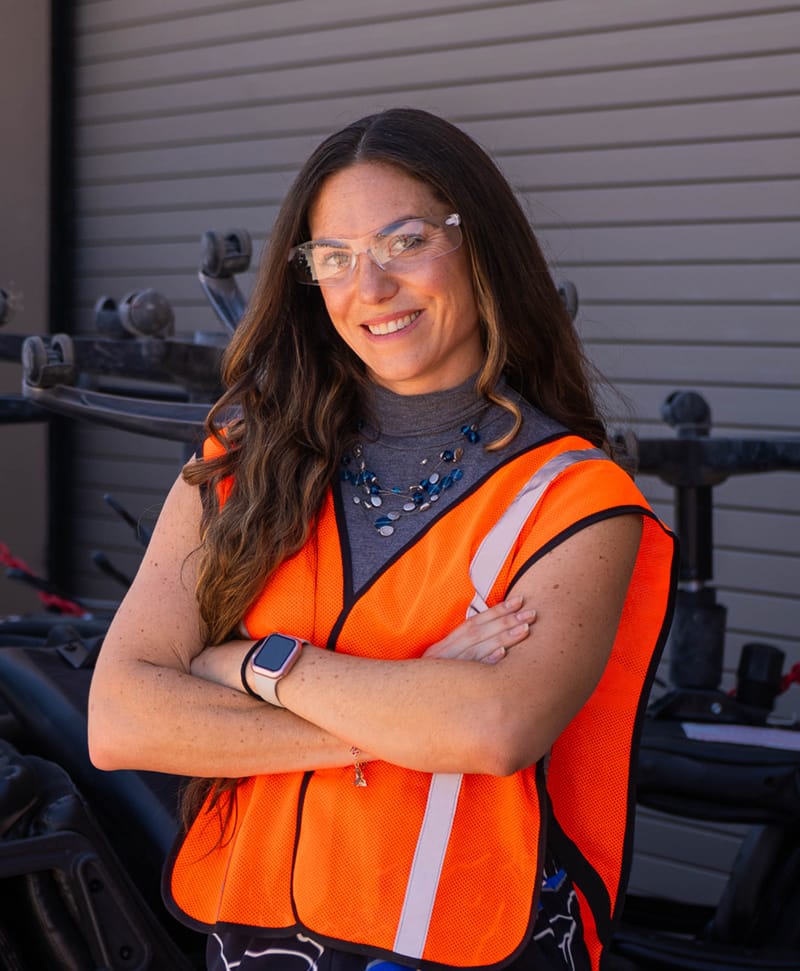Chelsi Tryon: Making the World a Better Place
For Chelsi Tryon, Director of Environmental, Social, and Governance (ESG) for WillScot Mobile Mini, nothing is more enjoyable than increasing the company’s sustainability efforts while simultaneously doing her bit to save the environment.
In 2022, Tryon was on maternity leave after giving birth to her second son when a recruiter contacted her and asked if she’d be interested in interviewing with WillScot Mobile Mini, a supplier of mobile offices and storage units, based in Phoenix, AZ.
Although she wasn’t looking for a new job, she was intrigued and curious to learn more about this industry, so she thought, why not?
It was a smart move. During the interview process Tryon realized WillScot was truly invested in sustainability for all the right reasons— to invest and drive ESG improvements while supporting the bottom line.
“Not only did WillScot promote the circular economy with our reuse and refurbishment processes, but it had officially launched ESG a year prior,” Tryon says. “So, I was excited about paving the way for the company to engrain sustainability into an already supportive culture and create an everlasting positive and measurable environmental impact.”
An Early Interest in Sustainability
At age 11 she participated in Take Your Daughter to Work Day with her father. After seeing him in action, solving problems, Tryon knew corporate America was in her future. She spent her growing-up years in southern California. Enjoying outdoor sports and nature was central to her lifestyle.
When it came to college, Tryon knew exactly what she wanted. She attended the School of Sustainability at Arizona State University at a time when many people her age had never heard of sustainability.
“To marry a business case with supporting the environment was just a natural progression,” she says. “Helping make the world a better place—how can you not love doing that?”

Chelsi Tryon is the director of environmental, social, and governance (ESG) at WillScot Mobile Mini.

Starting from the Ground Up
The Director of ESG position had been vacant for eight months when Tryon came onboard with WillScot.
“When I stepped in, it was like I was recharging and reinvigorating the program,” she says. “I could build the program from the ground up in a way that created value for our customers, investors, and our employees.”
Tryon has five primary responsibilities: producing the company’s annual ESG & Sustainability report, educating and engaging employees on the company’s programs, developing and implementing environmental enhancements, ensuring accurate public disclosures, and communicating with investors and customers to understand how the company can support their initiatives.
The data needed to create the ESG report (also called sustainability, CSR, or impact report) hadn’t been tracked, so Tryon spent her first year gathering, analyzing, and consolidating the data.
Benchmarking is a tool she finds useful. Tryon finds value in benchmarking WillScot against other companies to see what initiatives they are prioritizing as important, the technology they have invested in, and even how they achieve high ratings from ranking agencies. She accomplishes this by conversing regularly with specific sustainability peers.
She states, “In the ESG industry, we’re not benchmarking to display supremacy, we’re doing it because if we collectively enhance our initiatives, then our improvements are helping the world thrive.”
AI is a tool Tryon hopes to use in the future. “AI will be the biggest evolution related to sustainability reporting,” she says. “It is truly the way of the future.”
For example, using AI, she would be able to compare the impact on greenhouse gas emissions of replacing internal combustion engine trucks with zero-emission, electric trucks versus increasing route optimization to calculate the cost and impact of each potential solution. And she could accomplish it in a matter of minutes rather than hours.
Currently, Tryon is enjoying her work immensely. Her days are never the same, since she interacts with almost every department and people of every level, from the Board of Directors to the yard workers.
She especially enjoys seeing a coworker experience a “lightbulb moment” where they begin to realize how even the little things like recycling or donating materials can have a broad impact on the environment.
“That’s galvanizing,” she says. “It makes every day worth it.”
Making Advances
When Tryon first started at WillScot, many employees had no idea what ESG meant. Now, new employees are required to complete a company-created training course. The result? The company’s base level knowledge of ESG and sustainability has improved. Tryon also completed the company’s first greenhouse gas inventory which will be included in the ESG annual report that will come out in September.
In addition, she’s conducting a life cycle analysis to discover ways WillScot can improve the environmental impact of their modular units.
“I’m hopeful that having the data from our life cycle analysis will help advance the move toward increased modular construction,” she says.
Forward Thinking
What does Tryon wish the next five years would bring?
She’d like to see WillScot become the industry leader in their space so its name will be synonymous with caring about the environment and community.
She’d also like to see more modular building companies embrace sustainability. Smaller companies, especially, often don’t feel they can afford to invest in it.
“You have to be able to connect how their investment in sustainability has the capability of driving revenue,” Tryon says.
Another thing that would make Tryon’s day is across-the-board standardization for reporting and disclosures by the rating and ranking agencies. Currently they have different methodologies for ranking companies’ sustainability efforts. Standardization would make it much easier to do an “apples to apples comparison.”
Best Advice
Tryon, a self-admitted perfectionist, says the best piece of advice she ever received was, ‘Don’t let perfectionism be the enemy of good.’

“Sometimes just getting things across the line and letting the iteration process occur produces greater results,” she says.
Her advice to other young professionals is threefold. First, never stop learning. Second, don’t be afraid to work outside your job description or your department. And third, try to find a solution to solve cross-functional problems. It will help you build better relationships within the company.
About the Author: Shari Held is an Indianapolis-based freelance writer who has been covering the construction industry for more than 20 years.
More from Modular Advantage
AoRa Development Aims for New York’s First Triple Net Zero Building Using Modular Methods
More cities are providing funding for newer infrastructure projects as long as they meet sustainability requirements. This is how modular can fit the bill, thanks to its lower waste production.
Developers and Designers: Lessons Learned with Modular Design
Modular construction is attractive to many developers because sitework and module construction can occur simultaneously, shortening the schedule and reducing additional costs.
UTILE: Putting Modular Building on a Fast Track
In Quebec, UTILE is taking the lead in creating affordable modular buildings to help decrease the student housing shortage. During the process, the company discovered what it takes to make the transition to modular building a success.
Sobha Modular Teaches Developers How to Think Like Manufacturers
With its 2.7 million square foot factory in UAE, Sobha Modular is bringing both its high-end bathroom pods to high-end residences to Dubai while developing modular projects for the U.S. and Australia.
RoadMasters: Why Early Transport Planning is Make-or-Break in Modular Construction
In modular construction, transportation is often called the “missing link.” While it rarely stops a project outright, poor planning can trigger costly delays, rerouting, and budget overruns.
Navigating Risk in Commercial Real Estate and Modular Construction: Insights from a 44-Year Industry Veteran
Modular projects involve manufacturing, transportation, and on-site assembly. Developers must understand exactly what they are responsible for versus what they subcontract. Risk advisors should research the developer’s contractors, subcontractors, and design-build consultants—especially the modular manufacturer.
Art²Park – A Creative Application of Modular and Conventional Construction
Art²Park is more than a park building—it’s a demonstration of what modular construction can achieve when thoughtfully integrated with traditional materials. The use of shipping containers provided not only speed and sustainability benefits but also a powerful structural core that simplified and strengthened the rest of the building.
Building Smarter: A New Standard in Modular Construction Efficiency
Rising material prices, labour shortages, expensive financing and tightening environmental rules have made conventional construction slower, costlier, and more unpredictable. To keep projects on schedule and within budget, builders are increasingly turning to smarter industrialized methods.
Resia: Breaking All the Rules
Resia Manufacturing, a division of U.S.-based Resia, is now offering prefabricated bathroom and kitchen components to industry partners. Its hybrid fabrication facility produces more precise bathroom and kitchen components (modules) faster and at lower cost than traditional construction. Here’s how Resia Manufacturing does it.
How LINQ Modular Innovates to Bring Modular To The Market in the UAE and Beyond
LINQ Modular, with an office and three manufacturing facilities in Dubai, is a modular firm based in United Arab Emirates. The company is on a mission: to break open the housing and construction markets in the Gulf Cooperation Council (GCC) area with modular.










